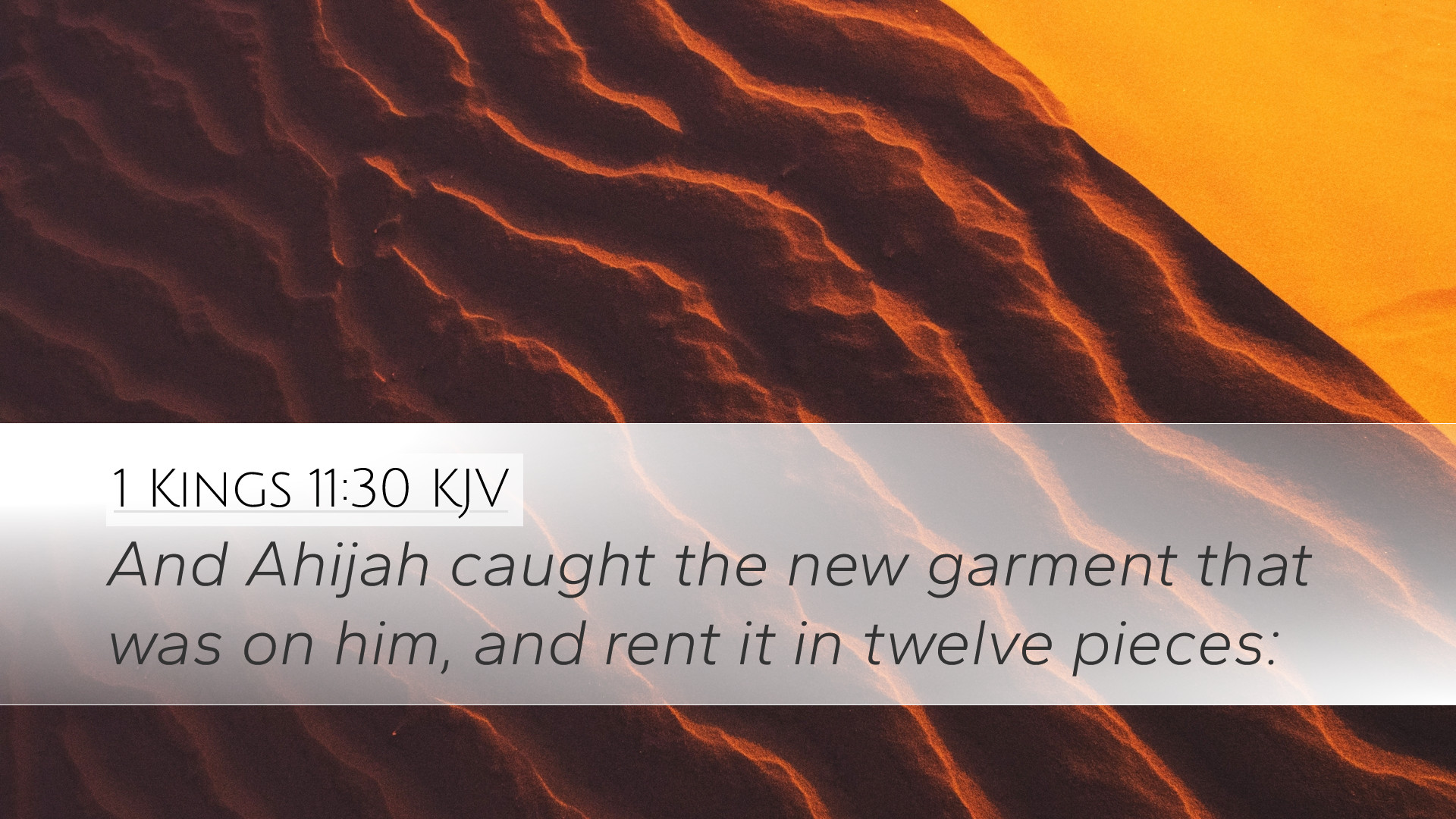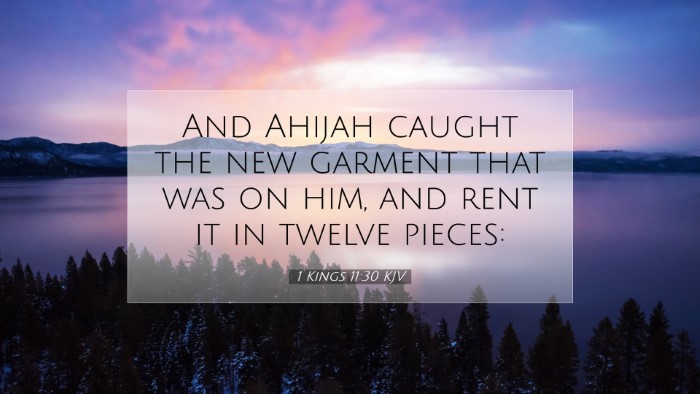Commentary on 1 Kings 11:30
1 Kings 11:30 states: "And Ahijah caught the new garment that was on him, and rent it in twelve pieces."
Overview
This verse is situated within the narrative of the decline of Solomon’s reign and the subsequent division of the United Kingdom of Israel. The event signifies divine judgment and the prophetic actions that reveal God’s intention regarding the kingdom.
Contextual Background
The backdrop of this passage is essential for understanding its implications. Solomon's Later Reign is marked by a decline due to idolatry, foreign alliances, and moral decay. Consequently, God raised up adversaries against Solomon, which includes Jeroboam, who is central to this prophetic drama.
The Prophetic Gesture
Ahijah's act of tearing a new garment serves multiple symbolic purposes:
- Symbol of Division: The tearing of the garment into twelve pieces represents the division of the kingdom into twelve tribes, emphasizing the forthcoming separation of the northern tribes from Judah.
- Symbol of Judgment: The act indicates God’s displeasure towards Solomon and the impending loss of the kingdom's unity due to unfaithfulness.
- Symbol of New Leadership: Jeroboam is introduced as a key figure who will lead the northern tribes, signifying a new beginning under a different leadership style and approach.
Commentary Insights
Various scholars have provided insight into the rich layers of meaning present in this brief but potent verse.
Matthew Henry's Commentary
Matthew Henry elaborates on the significance of the new garment as a symbol of Israel's current unity and future division. He notes:
- Garment of Unity: The new garment symbolizes the freshness of God's covenant with Israel, which will now be torn due to their unfaithfulness.
- Divine Direction: By choosing Ahijah for this prophetic action, God underscores the importance of His sovereignty and the divine appointment of leadership.
- Warning and Hope: While this prophetic act signals impending judgment, it also contains a thread of hope that God remains involved in directing the future of His people.
Albert Barnes' Notes
Barnes provides a detailed analysis of the implications of the action by Ahijah:
- Prophetic Authority: He points out that Ahijah's action is not merely symbolic but carries the weight of prophetic authority, signifying God's will and intention clearly.
- Judgment on Solomon: Barnes emphasizes that this tearing not only represents the division but also serves as a divine denunciation of Solomon's actions, marking a significant transition in Israel's history.
- Hope for Remnant: Importantly, he reminds readers that even amidst judgment, there is provision for a remnant, as Jeroboam is chosen to lead the north, hinting at future potential for restoration.
Adam Clarke's Commentary
Adam Clarke provides a contextual interpretation that enhances understanding:
- Cultural Significance: He shares insights about the cultural importance of garments in ancient Israel, noting how a new garment signifies something fresh and important in the social context.
- Spiritual Symbolism: The act of ripping the garment conveys a dramatic spiritual message to the people about the seriousness of their sin and the consequences of turning away from God.
- Indication of Future Events: Clarke emphasizes that this prophecy foreshadows the eventual plight of the people of Israel and serves as a pivotal moment in the overarching narrative of the Old Testament.
Theological Implications
This verse is laden with theological implications that resonate through the ages:
- God’s Sovereignty: It reasserts God’s ultimate control over historical events and reveals how He orchestrates the rising and falling of leaders according to His divine purpose.
- Judgment and Mercy: The interplay between impending judgment for the unfaithfulness of leaders and the mercy shown to the remnant encapsulates the complexity of God’s dealings with His people.
- Leadership Accountability: This event underscores the vital principle of accountability for leaders within the community of faith, reminding current leaders of their responsibilities before God.
Conclusion
In conclusion, 1 Kings 11:30 offers profound insights into the dynamics of leadership, accountability, and divine judgment. Ahijah's dramatic prophetic action serves as a divine communication of God's intent to divide the kingdom due to disobedience, while also hinting at the possibilities of restoration and hope through new leadership. This passage challenges believers to reflect on their faithfulness to God’s covenant and the implications of sin in community leadership.


